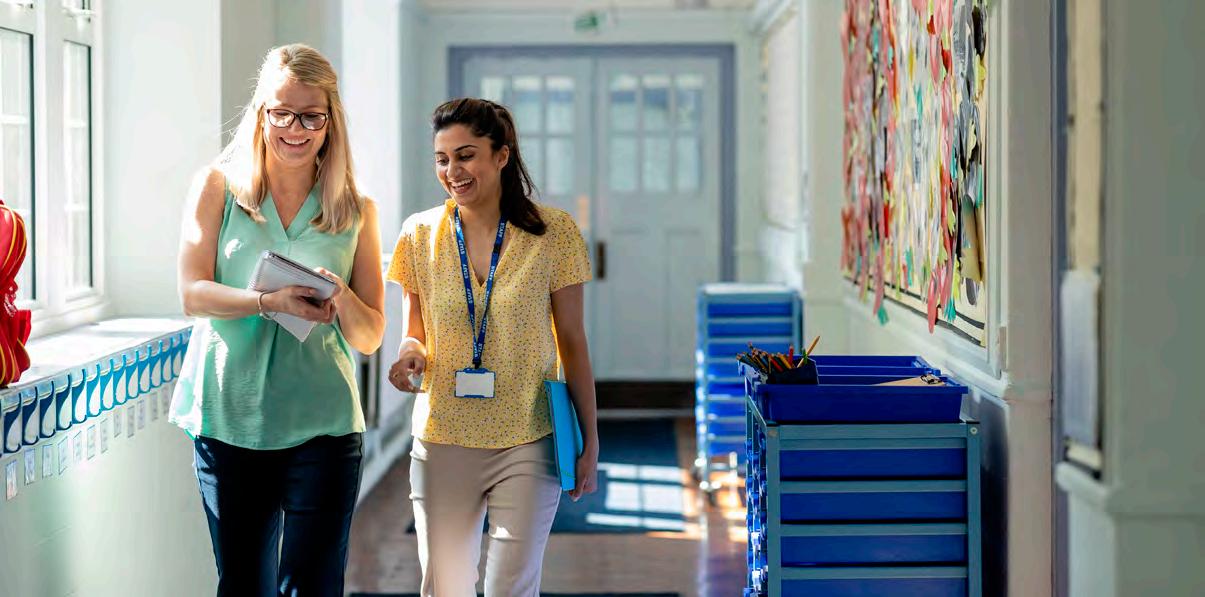
6 minute read
Journey into Educational Leadership
Audrey Azoulay
A professional journey always begins with a definition. We ask ourselves what is my role, and what is expected of me? ACECQA states that educational leadership is about driving change for the better. They go on to explain how educational leaders are agents of change on the journey to exemplary education and care (pg7).
When I was offered a role as educational leader in a centre where my early learning journey began, I was eager to return and explore what the role would look like in a 144-place long day care setting, after spending the last 12 years in a single unit community kindergarten as teacher/ director. Recent work with Australian Catholic University as a tertiary supervisor had opened my perspective and confidence in this type of mentoring role. I looked forward to the opportunity.
From the moment I started, the owner Janine was always available with insight into team members and the contrasts of working in long day care. Similarly, the director Kim was always available to discuss contexts, transferable skills of both educators and myself, and the bigger picture goals of the centre. Everyday I spent time building relationships with educators, setting realistic yet high expectations and actioning as much improvement as possible. Working in a larger team took me to unexpected places. During this time and through must reflecting I was becoming more aware of how my learning and working styles influenced how and what I did in this role. Similarly with the educators, in getting to know more about their philosophies and how it effected their programming style and workload management skills.
National Quality Standards outlines how educational leadership builds and promotes a positive organisational culture and professional learning community. NQS also states that the educational leader is supported and leads the development and implementation of the educational program and assessment and planning cycle. The guide outlines that the primary requirements of and educational leader role are to:
Here at Taigum Child Educare Centre the philosophy states “Together we are connected through our environment and community, with children and families”. It was obvious from the beginning that Together was a focus of understanding the role and on building team culture.
At Taigum Child Educare Centre we are continuing to value programs which are displayed in rooms and hands on child’s developmental portfolios. At the beginning of 2022, we had 3 amazing lead educators who were about to embark on their first experience leading a room. Together we met to discuss their strengths, experience so far and challenges of their new role. The face-toface collaborations helped me to understand that each educator is on their own professional journey and how we each have unique knowledge, ideas and systems of value. of perspectives when supporting educators in their roles. To understand the pressures of a challenging day in a room with small children and helping educators find the balance between prioritising time with children and ensuring their paperwork was effective to their program and well communicated with families
Understanding each educator as an individual is important to understanding the culture of the team. All educators were interested in who I was and how I fit into the role as educational leader. Something which looks different in each centre and for each person who works in the role. In the early months I invested a lot of time meeting with educator’s face to face, both as non-contact time, in the rooms and surveys. The information I received then formed how my role looked and continued to evolve from week to week. What I discovered, is that behind the happy children, checklists, and well organised rooms are REAL people each have their story, experiences, ideas strengths, challenges, qualifications and philosophies. It is everyone’s role to work together to build a sustainable team culture which inspires the best education for early years education.
One of the challenges in the role was to find the balance between spaces for individual educator freedom and autonomy and providing families with information. The National Quality Standards requires a program plan (NQS 1.3.1) and information for families (NQS 1.3.3), yet no specifics are outlined. It is up to individual centres or educators to unpack what this looks like for their community.
Just as importantly it is the role of educational leaders to inspire educators to create a meaningful and realistic program and planning cycle. This looks different for each educator, and is influenced by new children enrolling, staff absences and changes, even the weather.
Throughout the year I also organised whole team training opportunities. An occupational therapist came into the centre to talk about sensory processing. Building our knowledge of both the developmental needs of young children and supporting the additional needs of some. In May we meet as a whole team to begin our journey into reconciliation. Unpacking Narra Gunna Wali and reflecting on what we know and what we want to know. Bringing the team together provides spaces to share their understanding and stories on the same topic.
On reflection the professional practice which I learned the most was the value of building team culture through shared ownership of responsibilities.

In conclusion, Educational Leadership is more than just checking the planning cycle and planning professional development. It is about nurturing a workplace culture where everyone has space to contribute, and everyone is valued for their unique contributions they bring to the team. There is still so much more to learn as our profession evolves and teams change.
References
ACECQA. 2019. The Educational Leader Resource. [online] Available at: https://www.acecqa.gov. au/sites/default/files/2019-03/ TheEducationalLeaderResource.pdf [Accessed 8 December 2022].
Educational leadership is more than just checking intentional teaching plans and following children’s interests. It is about valuing the uniqueness of each educator as an individual. Just as we do with children an inspiring and motivating educator to be the best they can be.
After attending the Seaman and Slattery Leadership conference in June my takeaway lesson was to make space to see the diversity
ACECQA. 2020. Guide to the National Quality Framework. [online] Available at: https://www.acecqa.gov.au/sites/ default/files/2020-01/Guide-to-theNQF_2.pdf [Accessed 8 December 2022].
United Nations, 2015. Transforming Our World: The 2030 Agenda for Sustainable Development. New York: UN Publishing.





